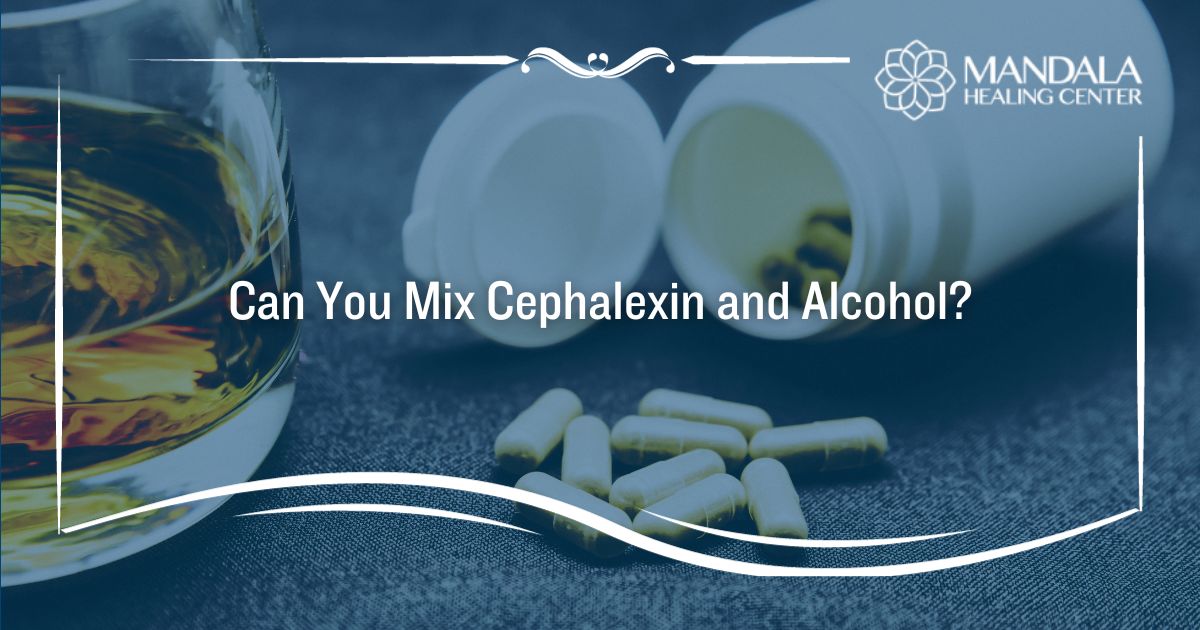Millions of people take prescription antibiotics like cephalexin each year to fight off bacterial infections. While these medications are safe when used under careful medical guidance, it’s crucial to know the possible risks and side effects of any drug you take–especially if you mix it with other substances.
Most American adults drink from time to time, and some develop unhealthy habits that can make it difficult to control how much alcohol they consume or stop drinking when they need to. However, mixing cephalexin and alcohol can cause unwanted side effects. It’s important to explore the risks and ask your doctor whether or not it is safe to mix cephalexin with alcohol.
This article will detail how cephalexin works, its potential side effects, and the possible risks of drinking alcohol while taking it. Reach out to the specialists at the Mandala Healing Center to find treatment to address alcohol misuse or for support during any stage of addiction recovery.
What is Cephalexin?
Cephalexin is a commonly prescribed generic antibiotic sole under the brand name Keflex. This antibiotic works by preventing bacteria from creating cell walls. Without cell walls, bacteria cannot survive.
Cephalexin is available as a liquid suspension, tablet, or capsule. People typically take it every six or twelve hours, depending on the condition being treated and the person’s age. People most often take cephalexin for seven to fourteen days.
Cephalexin is used to treat a range of bacterial infections, including:
- Urinary tract infections (UTIs)
- Respiratory tract infections
- Ear infections
- Skin infections
It is effective against several bacterial strains, including:
- Streptococcus pneumoniae
- Streptococcus pyogenes
- Haemophilus influenzae
- Staphylococcus aureus
- Moraxella catarrhalis
- Escherichia coli
- Proteus mirabilis
- Klebsiella pneumoniae
Cephalexin can only eliminate bacterial infections and is not prescribed to treat viral or fungal infections.
Is it Safe to Mix Cephalexin and Alcohol?
A typical course of cephalexin is about one to two weeks. If your doctor prescribes cephalexin, you must ask about the risk of mixing it with alcohol and follow their guidance.
The official FDA label on cephalexin packaging does not warn of interactions between this medication and alcohol. Alcohol does not impact the drug’s ability to fight bacterial infections or in any way alter how the drug works.
However, some people who mix cephalexin and alcohol may experience unwanted side effects. It’s important to understand the potential risks of mixing alcohol and cephalexin so you can make informed decisions about your health and well-being.
Potential Risks of Mixing Cephalexin and Alcohol
Like all drugs, cephalexin has a risk of side effects. Some of the most common side effects of cephalexin are:
- Nausea
- Vomiting
- Diarrhea
- Stomach pain and discomfort
- Indigestion
Some people may develop more severe side effects from taking cephalexin, including hemolytic anemia and allergic reactions.
Alcohol has many adverse side effects, including:
- Slurred speech
- Blurred vision
- Loss of coordination
- Mood swings
- Behavioral changes
- Drowsiness
- Nausea
- Vomiting
One of the most significant risks of mixing cephalexin and alcohol is worsened gastrointestinal symptoms. Indigestion, nausea, and vomiting are potential side effects of both cephalexin and alcohol and combining them may lead to worsening side effects.
Alcohol can weaken the body’s natural immunity and lower the body’s ability to fight infection. People typically take cephalexin to eliminate a bacterial disease. Many medical professionals advise patients to abstain from alcohol while taking antibiotics to better support their body’s ability to fight off the bacteria and heal.
Do I Need Alcoholism Treatment?
If you are taking cephalexin or other medications, your doctor may advise you to take a break from drinking. If you find that it’s challenging to stop drinking, it could be a sign that you need professional treatment and support to regain control over your drinking–or to stop drinking altogether.
Alcohol use is common and widely accepted in our culture. Many people engage in heavy drinking or binge drinking from time to time, and some people develop physical alcohol dependence that requires treatment.
It can sometimes be tricky to determine when your drinking habits have become problematic. Here are some signs that you may need help to address problematic drinking:
- You drink a lot without feeling buzzed or find you need to drink more to get a buzz than you did before
- You spend a lot of time, energy, and money getting alcohol, drinking, and dealing with hangovers
- You miss work or fall behind in your responsibilities at home, work, or school because of your drinking
- You engage in dangerous behaviors like driving under the influence or having unprotected sex while drinking
- You have experienced legal, financial, or social harm because of your drinking
- Your drinking has resulted in an accident or injury
- If you stop drinking, you experience withdrawal symptoms like nausea, insomnia, tremors, and sweating
- You isolate yourself from others or only spend time with others when drinking
- You want to stop drinking, but you feel like it’s out of control
If you or someone you love exhibits signs of alcohol misuse or addiction, seek treatment right away. Getting comprehensive, compassionate treatment can help you avoid the life-threatening consequences of alcohol addiction and live the healthy, sober lifestyle you choose.
Find Help Now
If you or someone you love struggles with alcohol abuse, you are not alone. Reach out to the Mandala Healing Center specialists now to learn about our holistic approach to alcohol addiction treatment or for support during recovery.












